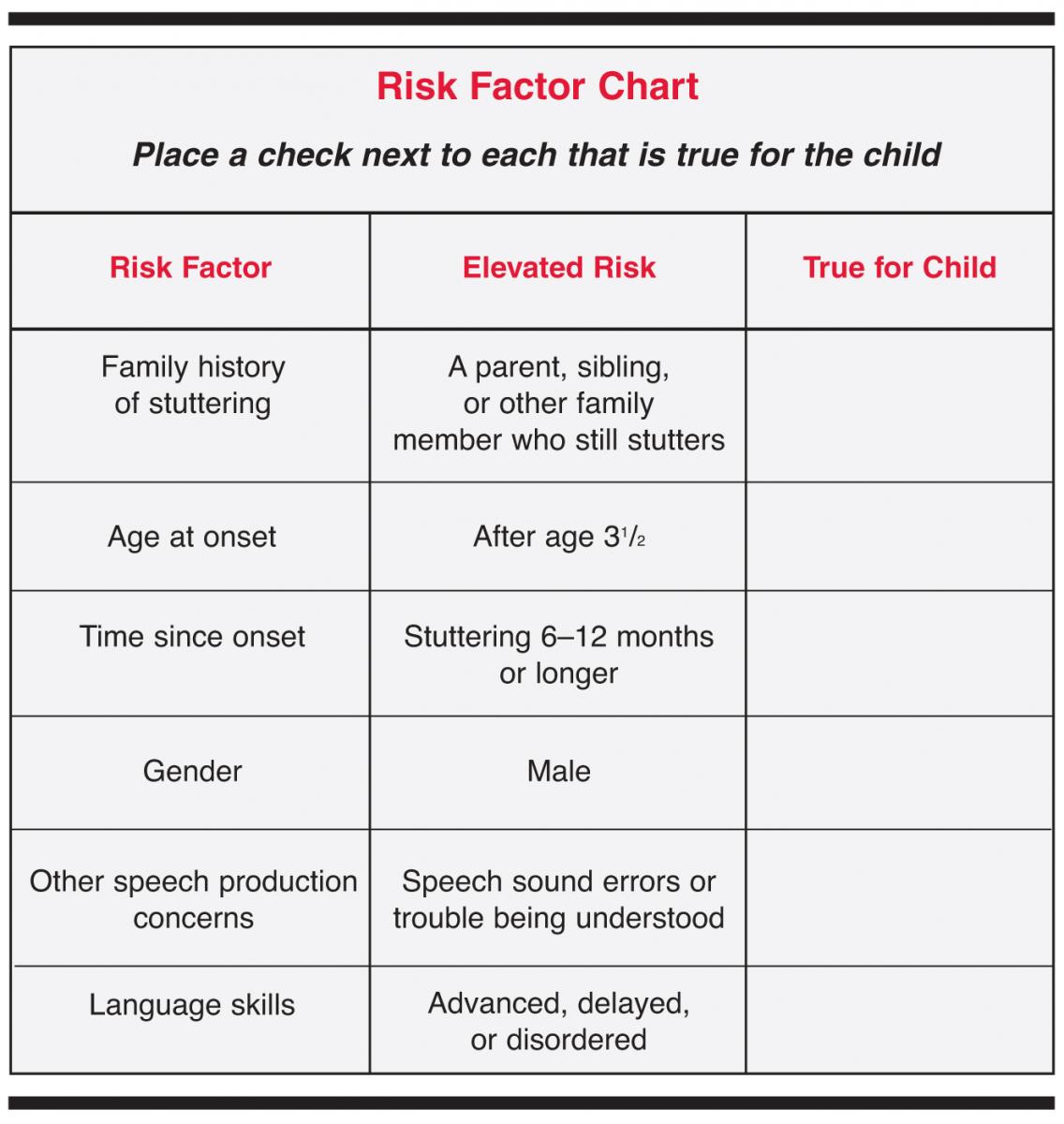Download this Risk Factor Chart
 Certain factors may place children at risk for stuttering. Knowing these factors will help you decide whether or not your child needs to see a speech-language pathologist 1,2. See the chart on the right. If your child has one or more of these risk factors, you should be more concerned. For a more detailed explanation of each risk factor, see SFA book 0011, If Your Child Stutters: A Guide for Parents available from our store -- see Best Sellers.
Certain factors may place children at risk for stuttering. Knowing these factors will help you decide whether or not your child needs to see a speech-language pathologist 1,2. See the chart on the right. If your child has one or more of these risk factors, you should be more concerned. For a more detailed explanation of each risk factor, see SFA book 0011, If Your Child Stutters: A Guide for Parents available from our store -- see Best Sellers.
- Family history
There is now strong evidence that almost half of all children who stutter have a family member who stutters. The risk that your child is actually stuttering instead of just having normal disfluencies increases if that family member is still stuttering. There is less risk if the family member outgrew stuttering as a child.
- Age at onset
Children who begin stuttering before age 3 1/2 are more likely to outgrow stuttering; if your child begins stuttering before age 3, there is a much better chance she will outgrow it within 6 months.
- Time since onset
Between 75% and 80% of all children who begin stuttering will begin to show improvement within 12 to 24 months without speech therapy. If your child has been stuttering longer than 6 months, or if the stuttering has worsened, he may be less likely to outgrow it on his own.
- Gender
Girls are more likely than boys to outgrow stuttering. In fact, three to four boys continue to stutter for every girl who stutters. Why this difference? First, it appears that during early childhood, there are innate differences between boys' and girls' speech and language abilities. Second, during this same period, parents, family members, and others often react to boys somewhat differently than girls. Therefore, it may be that more boys stutter than girls because of basic differences in boys' speech and language abilities and differences in their interactions with others. That being said, many boys who begin stuttering will outgrow the problem. What is important for you to remember is that if your child is stuttering right now, it doesn't necessarily mean he or she will stutter the rest of his or her life.
- Other speech and language factors
A child who speaks clearly with few, if any, speech errors would be more likely to outgrow stuttering than a child whose speech errors make him difficult to understand. If your child makes frequent speech errors such as substituting one sound for another or leaving sounds out of words, or has trouble following directions, you should be more concerned. The most recent findings dispel previous reports that children who begin stuttering have, as a group, lower language skills. On the contrary, there are indications that they are well within the norms or above. Advanced language skills appear to be even more of a risk factor for children whose stuttering persists3.
These risk factors place children at higher risk for developing stuttering. If your child has any of these risk factors and is showing some or all of the warning signs mentioned previously, you should be more concerned. You may want to schedule a speech screening with a speech therapist who specializes in stuttering. The therapist will decide whether your child is stuttering, and then determine whether to wait a bit longer or begin treatment right away.
1 Longitudinal research studies by Drs. Ehud Yairi and Nicoline G. Ambrose and colleagues at the University of Illinois provide excellent new information about the development of stuttering in early childhood. Their findings are helping speech-language pathologists determine who is most likely to outgrow stuttering versus who is most likely to develop a lifelong stuttering problem. Research reports include:
Yairi, E. & Ambrose, N. (1992). A longitudinal study of stuttering in children: A preliminary report. Journal of Speech, Language, and Hearing Research, 35, 755-760.
Ambrose, N. & Yairi, E. (1999). Normative disfluency data for early childhood stuttering. Journal of Speech, Language, and Hearing Research, 42, 895-909.
Yairi, E. & Ambrose, N. (1999). Early childhood stuttering I: Persistence and recovery rates. Journal of Speech, Language, and Hearing Research, 42, 1097-1112.
2 Yairi, E. & Ambrose, N. (2005). Early Childhood Stuttering: For Clinicians by Clinicians, ProEd, Austin, TX.
3 Yairi, E. & Ambrose, N. (2005). Early Childhood Stuttering: For Clinicians by Clinicians, Chapter 7, Pro-Ed, Austin, TX.






 Podcast
Podcast Sign Up
Sign Up Virtual Learning
Virtual Learning Online CEUs
Online CEUs Streaming Video Library
Streaming Video Library